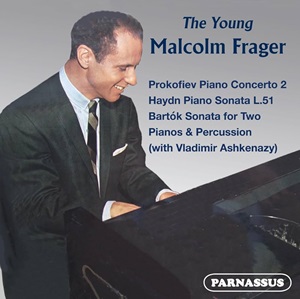
Malcolm Frager (piano)
The Young Malcolm Frager
Sergei Prokofiev (1891-1953)
Piano Concerto No 2 in G minor, Op 16
Joseph Haydn (1732-1809)
Piano Sonata No 51 in E-flat major, Hob.XVI:38
Béla Bartók (1881-1945)
Sonata for Two Pianos and Percussion, BB115 Sz110
Orchestre de la Société des Concerts du Conservatoire, Paris/René Leibowitz (Prokofiev)
Vladimir Ashkenazy (piano), Ruslan Nikulin (percussion), Valentin Snegirev (percussion) (Bartók)
rec. circa 1960 (Prokofiev); 1960 Paris (Haydn); 1963 Soviet Union (Bartók)
Parnassus PACD96090 [69]
The American pianist Malcolm Frager was born in 1935 and studied piano in New York with Carl Friedberg from 1949 until 1955, the year of Friedberg’s death. Frager then went on to win the Levintritt Award in 1959 and clinch first prize in the Queen Elisabeth of Belgium Competition a year later. He combined a concert career with an academic life, seeking out old, unpublished manuscripts, having a particular interest in the piano repertoire of Robert Schumann. Sadly, he was to die at the age of only fifty-six in 1991. He recorded for numerous record labels. Included on this release is his very first recording, the Prokofiev Piano Concerto No 2, set down shortly after his Belgium win.
The recording of Sergei Prokofiev’s Piano Concerto No 2 in G minor, Op 16 first appeared in 1960 on an RCA Victor Red Seal LP (LSC-2465). Partnering him are the Orchestre de la Société des Concerts du Conservatoire Paris, under the direction of René Leibowitz. The concerto was coupled with the Haydn Sonata also present on this release. The Concerto, cast in four movements rather than the traditional three, is a riveting performance in remarkably fine sound. Scored for a large orchestra, including three trombones, tuba, and a panoply of percussion, the engineers at the time managed to capture all the orchestral detail to stunning effect. A technical tour de force, Frager rises to the challenge admirably, and is particularly impressive in the first movement cadenza. This movement has a radiant lyrical opening before the rhetoric becomes more involved. The Scherzo is arresting, with Leibowitz keeping a firm grip on proceedings. There’s plenty of swagger and fluctuating emotion in the Intermezzo, and the finale is packed tight with exuberance, vim and vigour, with alternating moments of profound reflection. I enjoyed this performance very much, and it certainly stands shoulder to shoulder with my go-to recording with Ashkenazy/Previn.
Elegance, poise and refinement imbue Frager’s reading of Haydn’s delightful lesser-known and lesser-performed Sonata in E-flat Hob. XV1:38, one of the six Auenbrugger sonatas, dedicated to the wealthy and talented sisters Katharina and Marianna Auenbrugger, and published in 1780. The performance is stylish, idiomatic and characterful. Frager’s lightness of touch and articulation are immensely appealing. The central Adagio is shot through with wistfulness and regret, whilst the finale has a captivating smile and noble refinement.
Malcolm Frager is joined by Vladimir Ashkenazy on piano 11 for a performance of Bartók’s Sonata for Two Pianos and Percussion, BB115 Sz110. The percussionists are Ruslan Nikulin and Valentin Snegirev. This is a Soviet Union Recording from 1963, and appeared on a Decca LP (SXL 6130). It sounds excellent in this spruced-up remastering by Gene Gaudette. It’s a finely paced performance of tight rhythmic buoyancy and rampant, feral tempestuousness. The first movement grows and evolves from the slow, portentous opening of brooding menace, which sounds quite threatening. The two pianists successfully capture the tension and drama inherent in the music. Throughout, the dialogue between the performers shows a sense of determined and shared purpose.
All told, this is a terrific disc, showcasing several facets of the young Malcolm Frager’s distinctive and superior pianism. It deserves a place on the shelves of every piano aficionado.
Stephen Greenbank
Help us financially by purchasing from


















